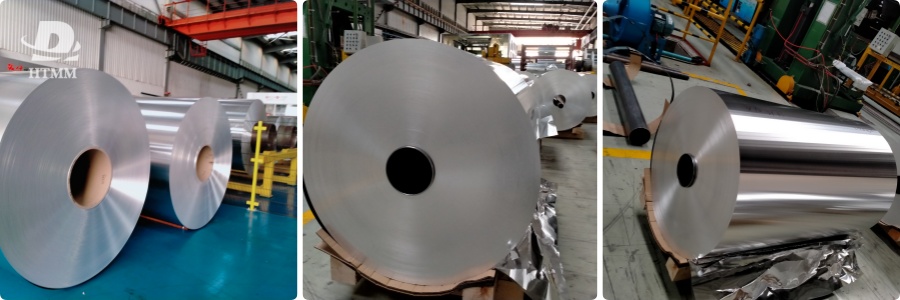Aluminum foil has become an integral part of daily life in households around the world due to its versatility, affordability and long shelf life. For household aluminum foil, Alloy 8011 emerges as an ideal grade, providing the right balance between formability, strength and bakeability required for general kitchen and food applications. In thinner grades below 20 microns, 8011 aluminum foil is produced by the world's leading aluminum mills and is widely used in domestic and commercial applications. This article explores the rapidly growing global demand for 8011 household aluminum foil rolls, key considerations when selecting manufacturers and top suppliers of profiles.
Learn about 8011 alloy aluminum foil
While other food-compliant foils such as 8079 and 1050 foil are better suited for more professional uses, 8011 stands out as the most suitable variety for the home. 8011 foil is composed of 97-98% pure aluminum and manganese as the main alloying elements, and has the following advantages over ordinary grades:
Increased strength: About 35% stronger than 1050 aluminum foil of the same thickness, but highly formable and suitable for pressure forming and packaging.
Improved Resistance: Higher resistance to denting, wrinkling or tearing during normal storage and use.
- EXCELLENT BAKEABILITY: 8011 foil performs well when exposed to heat during cooking and will not discolor or lose consistency at temperatures below 105 degrees Celsius.
- Anti-slip properties: Manganese alloy imparts surface properties to prevent sticking when baking or packaging.
-Cost Effective: Offers an ideal balance of all the above attributes at a very competitive market price.
Typical applications where 8011 aluminum foil is widely used include food storage, cooking, baking, grilling, cattle/poultry feed packaging, etc. It competes with plastic wrap and wax paper as an economical and reusable alternative. The most popular are thin household rolls of 8-15 microns.
Hot selling 8011 10-18 micron aluminum foil, cheap price
What factors should you consider when purchasing household aluminum foil?
While 8011 grade and thin gauges below 20 micron seem to be the standard, sourcing quality products at the best price requires evaluating some key parameters:
-Micron Thickness: The most popular are 8-15 micron rolls to meet common household needs. The 18 micron roll provides some extra strength.
-Roll Dimensions: Standard rolls are 10-12 inches wide and 75-100 feet long. Custom widths/core counts also available.
- Packaging and Labeling: Products should be tightly wrapped and properly sealed to prevent denting during shipping. Clearly print gross weight, manufacturer and other detailed information.
-Purity and Food Certification: Ingredients must meet FFC, GB food contact standards. Suppliers must be cGMP, FDA, EU approved.
-Surface quality: smooth and uniform in thickness, without waves or breaks, ensuring optimal functionality and aesthetics.
- Slip Coating: If required, non-stick coating should be BPA, heavy metal free for maximum safety.
-Pricing: Check delivery costs against market levels, taking into account required quantities and supplier locations.
-Manufacturer Reputation: Purchase from mature, experienced factories to minimize the risk of producing unprofessional or inferior raw materials.
-Consistency: Expect batches from the same supplier to be of the same quality over a period of time and to be used without interruption.
-Technical Support: Ability to resolve buyer's questions regarding use, product performance or defects.
- Green Credentials: Choose suppliers with sustainable, recycling-friendly practices to support eco-friendly shopping.
Factors to consider when choosing the best household aluminum foil manufacturer
When choosing a household aluminum foil roll supplier, some key aspects to evaluate include:
Production Facilities: Modern factories with automated processes help ensure consistency and purity. Inspection protocols should meet strict standards.
Certification: For products that come into direct contact with food during storage and cooking, suppliers must be approved to the highest global standards for food contact materials.
Sustainability: Leading suppliers have strong aluminum scrap sourcing and recycling programs and energy and emissions reduction roadmaps.
Quality: Parameters such as specification tolerances, surface finish uniformity, ability to pass inspection for stray metal particles, etc. should be continuously monitored and recorded.
Service: Good technical support, inventory management capabilities for JIT delivery, versatile packaging options add to the overall value.
Pricing: Competitive cost for equivalent quality due to economies of scale, raw material sourcing capabilities and operational efficiencies.
References: Obtain feedback from existing retailers, distributors or end users on past performance, product suitability, supply reliability.
Consistency: Ensuring that products of similar quality can be sourced in bulk over a period of time to avoid production issues or mid-stream specification changes.
By conducting a thorough evaluation based on these criteria, buyers can reliably source the best value household aluminum foil rolls that always meet all requirements and expectations. Regular audits also help eliminate any intermittent issues that arise at your manufacturing facility over time.
With its perfect combination of functional utility, affordability and purity, Alloy 8011 has become the aluminum foil of choice for home kitchen applications around the world. The leading global producers profiled here have the scale and expertise to consistently supply high quality thin gauge 8011 foil rolls. Regular evaluations help ensure that all current and future needs are met by purchasing from the most reliable manufacturers.

